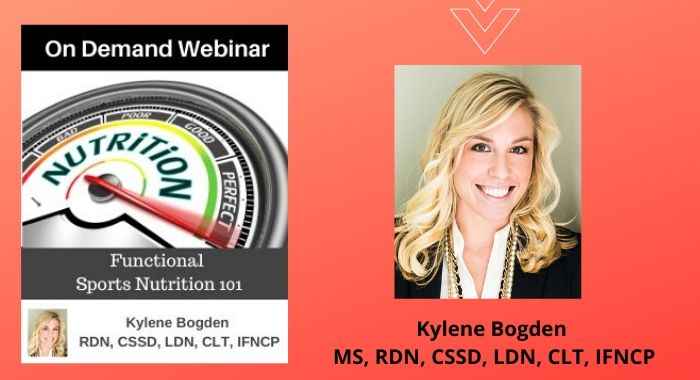
Functional Sports Nutrition 101
Learn how optimize athletic performance at the root with understanding the principles of functional nutrition

Functional Sports Nutrition 101
Learn how optimize athletic performance at the root with understanding the principles of functional nutrition
Kylene Bogden MS, RDN, CSSD, LDN, CLT, IFNCP
-
What you will learn in this course:
-
Learn how to assess an athlete through a Functional Medicine/Functional Nutrition Lens
-
Review safe and effective supplementation for sport through a functional lens
-
Understand the difference between a food allergy, food intolerance, and food sensitivity
-
Discover alternative options to standard pre and post-workout fuel
-
Learn how to properly guide an athlete through a standard elimination diet protocol without
sacrificing health and performance
-
-
1 Credit Hour as Approved by Commission on Dietetic Registration (CDR)
-
CDR Performance Indicators: 7.1.1, 7.2.1, 9.1.1, 9.5.1
- 1 Credit Hour as Approved by the Board of Certification for Athletic Trainers (BOC)
-
CSSD Exam Competencies addressed:
-
Analyze and interpret available data in the context of enhancing athletic performance and health.
-
Explain how energy is stored in skeletal muscle and other tissues.
-
Evaluate and interpret factors influencing substrate use and exercise metabolism data.
-
Evaluate factors that contribute to exercise-induced fatigue.
-
Describe the effects of nutrition and exercise on health and performance.
-
Explain the use of carbohydrates during exercise training, competition, and recovery.
-
Explain the use of fat during exercise training, competition, and recovery.
-
Explain the use of protein and amino acids during exercise training, competition, and recovery.
-
Describe vitamin and mineral requirements for training and exercise.
-
Describe the potential risks of excessive vitamin and mineral supplementation on health and performance.
-
Describe antioxidant function in relation to exercise, recovery, and long-term training adaptations.
-
Describe the efficacy of vitamin and mineral supplementation on health and performance
-
Design nutrition plans for individuals and groups incorporating exercise-specific recommendations for carbohydrates.
-
Design nutrition plans for individuals and groups incorporating exercise-specific recommendations for protein.
-
Evaluate effects of inadequate vitamin and mineral status on health and performance.
-
Design nutrition strategies for individuals and/or groups for pre-workout and precompetition, during training and competition, and for recovery following training and competition.
-
Evaluate products, foods, and meals in accordance with compliance and permissibility rules of governing body.
-
Assess fluid and electrolyte balance in training and performance.
-
Evaluate the effects of dehydration, over-hydration, hypothermia, and hyperthermia on training and performance.
-
Design strategies for maintaining hydration and electrolyte balance before, during, and after exercise.
-
Evaluate fluid intake for training, performance, and recovery.
-
Evaluate the effects of environmental conditions on hydration status
-
Evaluate the efficacy and safety of popular diets for weight management, health, and performance.
-
Design nutrition strategies for active individuals with acute or chronic illness and/or injury.
-